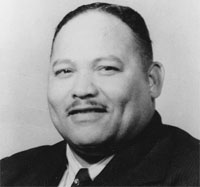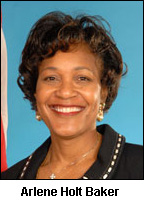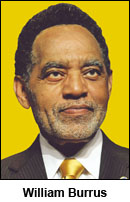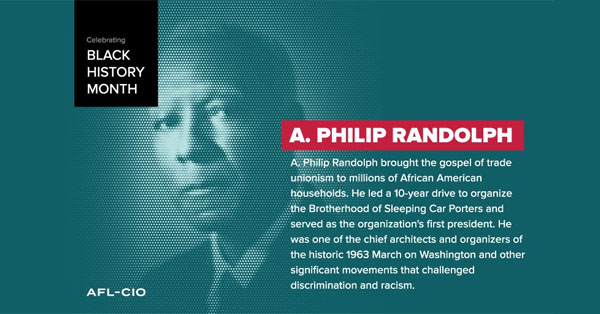 Rev. George W. Lee
Rev. George W. Lee — In 1955, the murder of Emmett Till shocked the United States and was a pivotal moment in the civil rights movement. But Till wasn’t the only prominent murder of an African American in Mississippi that year and the murder of the Rev. George W. Lee not only informed the reaction to Till’s murder, but Lee’s murder was part of the pathway to the passage of the Voting Rights Act a decade later.
Muhammad Ali— Born Jan. 17, 1942, in Louisville, Kentucky. Ali experienced firsthand racism and discrimination while growing up in the segregated South.
 Arlene Holt Baker— Arlene became the first African American to hold one of the AFL-CIO’s three highest offices. As executive vice president, Arlene fought for working people in many areas, with particular focus on collective bargaining rights, health care, fair trade, immigrant rights, LGBTQ+ rights, voting rights and the right for all union members to fully participate in democratic unions that reflect the rich diversity of the workplace.
Arlene Holt Baker— Arlene became the first African American to hold one of the AFL-CIO’s three highest offices. As executive vice president, Arlene fought for working people in many areas, with particular focus on collective bargaining rights, health care, fair trade, immigrant rights, LGBTQ+ rights, voting rights and the right for all union members to fully participate in democratic unions that reflect the rich diversity of the workplace.
Ella Josephine Baker— In 1957, Baker moved to Atlanta to help organize the Southern Christian Leadership Conference (SCLC), a new organization created by the Rev. Martin Luther King Jr. Baker left the SCLC in 1960 to help organize with a group of college students and activists in Greensboro, N.C. The students sparked a series of peaceful protests at a F.W. Woolworth store lunch counter that would gain national attention and also spark resistance across the South.
Rachel Bryan— Rachel Bryan is currently the governmental relations and community liaison at Electrical Workers (IBEW) Local 595 in Stockton, Calif. she works tirelessly with community groups, her local labor council, the Electrical Workers Minority Caucus and the AFL-CIO to promote racial equality and economic development for African Americans, other minorities and women in the workforce.
 William Burrus — A participant in the Great Postal Strike of 1970, Burrus was elected president of the Cleveland local of the American Postal Workers Union (APWU). In 1980, Burrus began a 21-year run as APWU’s executive vice president, working alongside APWU President Moe Biller. His dedication and hard work on behalf of his fellow postal workers led to him being elected national president of APWU in 2001, the first African American of any national union to win the top office by a direct ballot of the membership.
William Burrus — A participant in the Great Postal Strike of 1970, Burrus was elected president of the Cleveland local of the American Postal Workers Union (APWU). In 1980, Burrus began a 21-year run as APWU’s executive vice president, working alongside APWU President Moe Biller. His dedication and hard work on behalf of his fellow postal workers led to him being elected national president of APWU in 2001, the first African American of any national union to win the top office by a direct ballot of the membership.
Charlene Carruthers — Carruthers is the national director of Black Youth Project 100, an activist, member-led organization of black 18-to-35-year-olds dedicated to creating justice and freedom for all black people.
Septima Poinsette Clark— By the time she was 20, she began a teaching career that lasted more than 40 years. While teaching, she pursued higher education and activism. She participated in a class-action lawsuit that led to pay equity for black and white teachers.
Fred Hampton— In 1968, he founded the Chicago chapter of the Black Panther Party and established a community service program that included free breakfast for school children and a free medical clinic. Hampton formed the “rainbow coalition,” a non-aggression pact that brought together Chicago’s most powerful gangs.
Bayard Rustin— Rustin served the trade union and civil rights movements as a brilliant theorist, tactician and organizer. In the face of his accomplishments, Rustin was silenced, threatened, arrested, beaten and fired from leadership positions because he was an openly gay man in a severely homophobic era.

A. Philip Randolph— A. Philip Randolph was one of the greatest black labor leaders in America’s history and a key founder of the modern American civil rights movement.
Keep reading these AFL-CIO profiles of various African American leaders and activists:
Hattie Canty
Echol Cole
Fannie Lou Hamer
Elle Hearns
Charles Horhn
Velma Hopkins
Marsha P. Johnson
William Lucy
Doug Moore
Isaac Myers
Bree Newsome
OUR Walmart workers
Lucy Gonzales Parsons
Fred Redmond
Keith Richardson
Kenneth Rigmaiden
Umi Selah
Augusta Thomas
Rosina Tucker
Robert Walker
Sue Cowan Williams
Diann Woodard